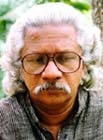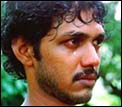

|
|
|
|
| HOME | MOVIES | QUOTE MARTIAL | |||
|
July 31, 1997
BILLBOARD
|
The Movie Interview/Adoor Gopalakrishnan"My views are reflected in my films -- the fears,
|
||||||

|
| Adoor Gopalakrishnan |
Yes, Mathilukal recreated Basheer's experience in many ways -- and he was very pleased with the film. He said to me, "Adoor, you should feel free to use any of my stories".
What was the controversy about Vidheyan (The Servile)?
Paul Zacharia, the author of the story, I think, made a fuss for publicity's sake. I found out later that he was bringing out an English translation of his stories. Even though he made objections to my film, he chose to use stills from it in his collection of stories.
One of your hallmarks is your focus on your particular milieu, the decline of the Nair family of central Travancore. Because my family comes from that area, I personally find your films utterly true to life, in the speech patterns of the people and the scenic beauty of the surroundings. Do you intend to expand your camera lens to a broader perspective in future films?
I have been thinking of making a film with a broader canvas -- with the whole expanse and variety of the country in the background.
Your attention to detail is extraordinary. In Kodiyettam I remember the simple sounds of rural Kerala. In Kathapurushan, I remember the scene where the Congress party men walk down a country lane, and there is a stray dog, one of those intelligent little mongrels, trotting down the lane at them. Absolutely realistic.
For Kodiyettam, I recorded the entire sound over a few months -- and I don't think viewers miss the background music. In Kathapurushan, I tried to pay attention to the transformations -- as society transforms, clothes, houses, hairstyles, vehicles, vegetation, clothing, utensils, props, everything changes, transforming before your eyes through a period of 40 years.
It is hard to talk about your films without discussing another giant of Malayalam cinema, the late G Aravindan.

|
| Click for bigger pic! |
One of the charges made against you is that there is too much eating and too much crying in your films, and that nothing much happens. And you always see the women feeding the men.
Eating is a happening. It is so critical; sleeping is a happening, so is crying. Laughing is human behaviour. Eating is one of the most important aspects of life, isn't it? Along with sleeping and procreating. As for women feeding men before they eat, it was and is in the Indian milieu at the time and in the society I depict. In a traditional family even a mother wouldn't eat with her son. It's a social fact.
A retrospective of your films was held in New York in 1994. Are there more coming?
I have had a number of retrospectives and a few more are upcoming. Most recently, a tribute -- three films, in Denver: the first time ever they showed an Indian film. It was very successful in terms of attendance and audience reaction. As for San Francisco, it is up to the festival people: they have not asked me to do so yet.
How do you view the state of the cinema in India today? Is there an influx of Hollywood films that threatens the commercial film industry?
Hollywood films dubbed in Hindi are a threat. The spectacle films like Jurassic Park can be successful, because dialogue is not very important -- mostly action with a little dialogue. I think this trend should not be encouraged, it can kill off the regional cinema.
Do you feel that Indian films are beginning to catch up with Hollywood on technical matters?
Regional cinema certainly cannot compete, even Bollywood cannot. We shouldn't be doing this: language is part of the culture, and it is under attack. What the French did is right, in my opinion: putting some limits on mass importation of American productions to protect their national film industry.

|
| Click for bigger pic! |
Mani Ratnam and others are clever and know how to make more their films more acceptable at the box office. But they sometimes flop too, the formula may not be successful all the way.
The New Wave is just journalistic jargon: the quality of the films depends on individual film-makers. Unfortunately, except those in Kerala, most of them have not become friendly with the audience enough to develop a following and so that forced a decline. No movement can be sustained minus an audience. Still, some are making uncompromising films; there is no dearth of new talent.
What is the situation with Malayalam films? Do you find any newcomers of note? A few such films are still being made, especially those with links to the NFDC or Doordarshan.
I noticed Kathapurushan was a co-production with the Japanese TV Network, NHK. Are more foreign producers interested in working with world-class Indian film-makers now?
There is certainly more interest these days. NHK approached me. The UK's Channel 4 has been commissioning a lot of films. In fact, all over Europe -- BBC, ZDF in Germany, RAI in Italy, Arte in France -- all these TV networks are producing good films, realizing that meaningful cinema cannot entirely depend on box-office. Even some non-studio American producers get the support of these networks.
Is your next production in the works at this time?
It has started ticking, and I will get into it -- in a year or two.
As a film-maker and observer of the country, what is your view of India at the age of fifty? Or is Kathapurushan the crystallisation of your view?
My views are reflected in my films -- the fears, the hopes, the sense of achievement. I will not make statements, other than through my films. I think Kathapurushan is sort of a Pilgrim's Progress -- of a middle class Kerala man. The 'progressive' (ulpatishnu) mind and its development -- his desires, his protests, his disappointments, his withdrawal, his return to the fray, his reflections.